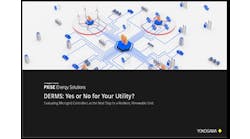According to Martin Hering, business development manager at Bosch, fuel cell technology and microgrids will help transition into the energy system of the future. As a lead up to Microgrid 2023, Hering recently spoke to Elisa Wood, editor-in-chief of Microgrid Knowledge, to discuss what’s next for microgrids.
There are multiple factors driving the adoption of decentralized energy solutions like microgrids. Hering specifically mentioned the rising cost of electricity, increased grid unreliability as well as the growing demand for electricity from electric vehicles, charging stations and other electrification efforts.
But, he said, “Microgrids that combine multiple assets, such as solar, battery, fuel cells or other generation technologies, combined with smart controls and a digital layer that provides accessibility, really have the capabilities to address most, if not all, of the growing and available customer pains.”
How fuel cells can power a microgrid
Hering said Bosch is particularly interested in solid oxide fuel cells, which are electrochemical devices that directly convert chemical energy into electrical energy. He described them as “a decentralized power generator with high efficiencies, which can ultimately reduce or eliminate your carbon emissions.”
Hering explained that fuel cell-based microgrids can be deployed both in front of the meter and behind the meter.
If used in front of the meter, fuel cells typically run on pure hydrogen or other clean fuels, according to Hering. In this application, fuel cells can serve as an alternative to traditional standby diesel or gas generation assets. Typically only used for a couple of events per year, they would “remain a stranded asset that you are investing in with the purpose of hopefully never using it,” Hering said.
If used behind the meter, fuel cells can provide clean, continuous power generation. This application would use both low and high temperature fuel cell technologies, running on either conventional or renewable fuels.
“The fuel cell provides a firm baseload and remains online for the majority of the year,” Hering said. He also noted that in this scenario, fuel cells can help optimize a microgrid’s battery storage and solar.
Investing in tomorrow
One of the things Hering is most excited about when it comes to fuel cells is that they’re an investment in the future. You can run them on conventional fuels today, he said, but they’re also preparing you for the cleaner fuels of tomorrow, like hydrogen.
Bosch is seeing interest in fuel cell-based microgrids from a variety of sectors, but Hering believes the commercial and light industrial sectors will be two of the most common use cases for the technology.
“Commercial real estate, such as office buildings or smaller scale data centers, can really benefit from the high efficiency and the firm baseload” offered by fuel cells, Hering said.
Real world testing
During the interview, Hering discussed the fuel cell-based microgrid demonstration project that Bosch is building at its research and technologies center in California. Designed to demonstrate the capabilities of smaller scale fuel cells to island and build firm microgrids, the microgrid will provide power to the critical loads inside the demonstration space.
Learn more about incorporating cleaner fuels in microgrids at Microgrid 2023: Lights On!, which will be held May 16-17 in Anaheim, California.








